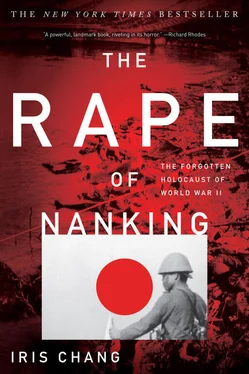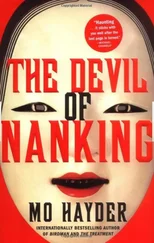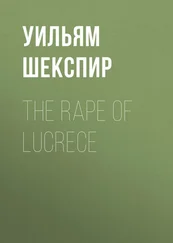In the 1930s, Japanese military leaders had boasted—and seriously believed—that Japan could conquer all of mainland China within three months. But when a battle in a single Chinese city alone dragged from summer to fall, and then from fall to winter, it shattered Japanese fantasies of an easy victory. Here, this primitive people, illiterate in military science and poorly trained, had managed to fight the superior Japanese to a standstill. When Shanghai finally fell in November, the mood of the imperial troops had turned ugly, and many, it was said, lusted for revenge as they marched toward Nanking.
THE JAPANESE strategy for Nanking was simple. The imperial army exploited the fact that the city was blocked by water in two directions. The ancient capital lay south of a bend in the Yangtze River that first coursed northward and then turned to flow east. By converging upon Nanking in a semicircular front from the southeast, the Japanese could use the natural barrier of the river to complete the encirclement of the capital and cut off all escape.
In late November, three parallel Japanese troops rushed toward Nanking. One force traveled west under the southern bank of the Yangtze River. Its troops poured into the Yangtze Delta, through the Paimou Inlet northwest of Shanghai, and along the Nanking–Shanghai railway, where the Japanese air force had already blasted away most of the bridges. These troops were led by Nakajima Kesago, who had worked as a member of Japanese army intelligence in France and later as chief of the Japanese secret police for Emperor Hirohito. Not much has been written about Nakajima, but what has been written is overwhelmingly negative. David Bergamini, author of Japan’s Imperial Conspiracy , called him a “small Himmler of a man, a specialist in thought control, intimidation and torture” and quoted others describing Nakajima as a sadist who packed for his journey to Nanking special oil for burning bodies. Even his biographer, Kimura Kuninori, mentioned that Nakajima had been described as “a beast” and “a violent man.”

Another force readied itself for a bold amphibious assault across Tai Hu, a lake situated halfway between Shanghai and Nanking. This force moved west from Shanghai in a route south of Nakajima’s troops. Directing the movement was General Matsui Iwane, a frail, slight, tubercular man with a tiny mustache. Unlike Nakajima, Matsui was a devout Buddhist from a scholarly family. He was also the commander-in-chief of the Japanese imperial army for the entire Shanghai-Nanking region.
A third force traveled further south of Matsui’s men and swerved northwest toward Nanking. Heading this force was Lieutenant General Yanagawa Heisuke, a bald, short man with literary interests. Perhaps to a greater degree than most other Japanese involved in the Rape of Nanking, his life during the invasion is veiled in mystery. According to his biographer, Sugawara Yutaka, the fascist clique that took control of the Japanese military had expelled Yanagawa from their ranks because he attempted to stop their 1932 coup. After his marginalization and demotion to the reserves, Yanagawa served as a commanding officer in China and performed “great military achievements… including the surrounding of Nanking,” but the military withheld his name and photograph from publication at the time. Thus Yanagawa was known to many in Japan as “the masked shogun.”
Little was spared on the path to Nanking. Japanese veterans remember raiding tiny farm communities, where they clubbed or bayoneted everyone in sight. But small villages were not the only casualties; entire cities were razed to the ground. Consider the example of Suchow (now called Suzhou), a city on the east bank of Tai Hu Lake. One of the oldest cities of China, it was prized for its delicate silk embroidery, palaces, and temples. Its canals and ancient bridges had earned the city its Western nickname as “the Venice of China.” On November 19, on a morning of pouring rain, a Japanese advance guard marched through the gates of Suchow, wearing hoods that prevented Chinese sentries from recognizing them. Once inside, the Japanese murdered and plundered the city for days, burning down ancient landmarks and abducting thousands of Chinese women for sexual slavery. The invasion, according to the China Weekly Review, caused the population of the city to drop from 350,000 to less than 500.
A British correspondent had the opportunity to record what was left of Pine River, (Sungchiang, a suburban city of Shanghai), nine weeks after the Japanese had passed through it. “There is hardly a building standing which has not been gutted by fire,” he wrote. “Smoldering ruins and deserted streets present an eerie spectacle, the only living creatures being dogs unnaturally fattened by feasting on corpses. In the whole of Sungchiang, which should contain a densely packed population of approximately 100,000, I saw only five Chinese, who were old men, hiding in a French mission compound in tears.”
But the worst was still to come.
On December 7, as the Japanese troops zeroed in on Nanking, General Matsui grew feverishly ill in his field headquarters at Suchow—another flare-up of his chronic tuberculosis. The illness struck Matsui right when power shifted from his command to that of a member of the imperial family. Only five days earlier Emperor Hirohito had promoted Matsui out of the action while dispatching his own uncle, Prince Asaka Yasuhiko, to the front to replace him. Under the new order, Matsui would be in charge of the entire central China theater, while Asaka, a lieutenant general with a thirty-year tenure in the military, would take responsibility as the new commander-in-chief of the army around Nanking. As a member of the royal family, Asaka possessed power that would override all other authority on the Nanking front. He was also closer to Lieutenant General Nakajima and General Yanagawa than to Matsui because he had spent three years in Paris with them as a military intelligence officer.
Little is known as to why Hirohito chose at this critical moment to give Asaka this position, though Bergamini believes it was done to test Asaka, who had sided with the emperor’s brother Chichibu against Hirohito on a political issue during the February 1936 army mutiny. On the palace rolls, Hirohito had singled out Asaka as the one member of the royal family who possessed an attitude that was “not good” and apparently gave his uncle the appointment at Nanking as an opportunity to redeem himself.
At the time it seemed like a trivial change, but later, for the lives of hundreds of thousands of Chinese, it would prove to be a critical one.
It is hard to describe what really happened behind the scenes in the Japanese army because many of the details were given by Matsui and his colleagues years later at their war crimes trial, or by sources who may be unreliable, and they are therefore cited with caution. But if their testimony can be believed, this is what we learn. Wary of the imperial newcomer and the potential for abuse of power, Matsui issued a set of moral commandments for the invasion of Nanking. He ordered his armies to regroup a few kilometers outside the city walls, to enter the Chinese capital with only a few well-disciplined battalions, and to complete the occupation so that the army would “sparkle before the eyes of the Chinese and make them place confidence in Japan.” He also called a meeting of staff officers before his sickbed and proclaimed:
The entry of the Imperial Army into a foreign capital is a great event in our history… attracting the attention of the world. Therefore let no unit enter the city in a disorderly fashion…. Let them know beforehand the matters to be remembered and the position of foreign rights and interests in the walled city. Let them be absolutely free from plunder. Dispose sentries as needed. Plundering and causing fires, even carelessly, shall be punished severely. Together with the troops let many military police and auxiliary military police enter the walled city and thereby prevent unlawful conduct.
Читать дальше












